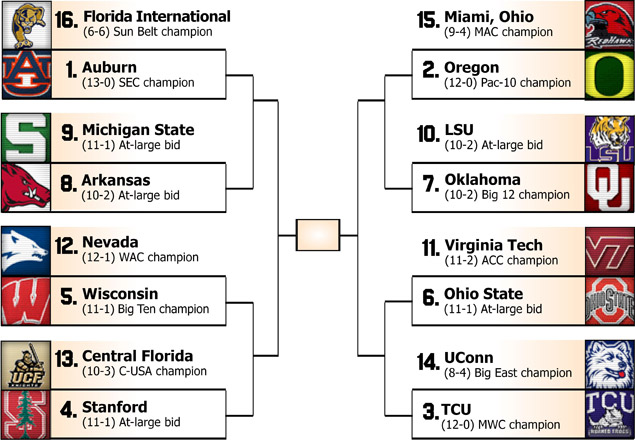Jack Lambert
Hall of Famer
- Joined
- Jan 3, 2009
- Messages
- 4,743
2010-11 College Football Bowl Schedule
Bowl Location Date/Time Network
New Mexico
BYU vs. UTEP Albuquerque, N.M.
University Stadium Dec. 18
2 p.m. ESPN
uDrove Humanitarian
Northern Illinois vs. Fresno State Boise, Idaho
Bronco Stadium Dec. 18
5:30 p.m. ESPN
R+L Carriers New Orleans
Ohio vs. Troy New Orleans
Louisiana Superdome Dec. 18
9 p.m. ESPN
Beef 'O' Brady's St. Petersburg
Southern Mississippi vs. Louisville
St. Petersburg, Fla.
Tropicana Field Dec. 21
8 p.m. ESPN
MAACO Las Vegas
Utah vs. Boise State Las Vegas
Sam Boyd Stadium Dec. 22
8 p.m. ESPN
S.D. County Credit Union Poinsettia
Navy vs. San Diego State San Diego
Qualcomm Stadium Dec. 23
8 p.m. ESPN
Sheraton Hawaii
Hawaii vs. Tulsa Honolulu
Aloha Stadium Dec. 24
8 p.m. ESPN
Little Caesars
Florida International vs. Toledo Detroit
Ford Field Dec. 26
8:30 p.m. ESPN
AdvoCare V100 Independence
Air Force vs. Georgia Tech Shreveport, La.
Independence Stadium Dec. 27
5 p.m. ESPN2
Champs Sports
West Virginia vs. NC State Orlando, Fla.
Florida Citrus Bowl Dec. 28
6:30 p.m. ESPN
Insight
Missouri vs. Iowa Tempe, Ariz.
Sun Devil Stadium Dec. 28
10 p.m. ESPN
Military Bowl Presented By Northrop Grumman
East Carolina vs. Maryland Washington, D.C.
RFK Stadium Dec. 29
2:30 p.m. ESPN
Texas
Illinois vs. Baylor Houston
Reliant Stadium Dec. 29
6 p.m. ESPN
Valero Alamo
Oklahoma State vs. Arizona San Antonio
Alamodome Dec. 29
9:15 p.m. ESPN
Bell Helicopter Armed Forces
Army vs. SMU Dallas
Gerald J. Ford Stadium Dec. 30
Noon ESPN
New Era Pinstripe
Kansas St. vs. Syracuse Bronx, N.Y.
Yankee Stadium Dec. 30
3:20 p.m. ESPN
Franklin American Mortgage Music City
North Carolina vs. Tennessee Nashville, Tenn.
LP Field Dec. 30
6:40 p.m. ESPN
Bridgepoint Education Holiday
Nebraska vs. Washington San Diego
Qualcomm Stadium Dec. 30
10 p.m. ESPN
Meineke Car Care
South Florida vs. Clemson Charlotte, N.C.
Bank of America Stadium Dec. 31
Noon ESPN
Hyundai Sun
Notre Dame vs. Miami El Paso, Texas
Sun Bowl Dec. 31
2 p.m. CBS
AutoZone Liberty
Georgia vs. UCF Memphis, Tenn.
Liberty Bowl Dec. 31
3:30 p.m. ESPN
Chick-fil-A
South Carolina vs. Florida State Atlanta
Georgia Dome Dec. 31
7:30 p.m. ESPN
TicketCity
Northwestern vs. Texas Tech Dallas
Cotton Bowl Jan. 1
Noon ESPNU
Outback
Florida vs. Penn State Tampa, Fla.
Raymond James Stadium Jan. 1
1 p.m. ABC
Capital One
Alabama vs. Michigan State Orlando, Fla.
Florida Citrus Bowl Jan. 1
1 p.m. ESPN
Gator Bowl
Mississippi State vs. Michigan Jacksonville, Fla.
Municipal Stadium Jan. 1
1:30 p.m. ESPN2
Rose Bowl Game presented by VIZIO
Wisconsin vs. TCU Pasadena, Calif.
Rose Bowl Jan. 1
5 p.m. ESPN
Tostitos Fiesta
Connecticut vs. Oklahoma Glendale, Ariz.
U. of Phoenix Stadium Jan. 1
8:30 p.m. ESPN/ESPN3D
Discover Orange
Stanford vs. Virginia Tech Miami
Sun Life Stadium Jan. 3
8:30 p.m. ESPN
Allstate Sugar
Ohio State vs. Arkansas New Orleans
Louisiana Superdome Jan. 4
8:30 p.m. ESPN
GoDaddy.com
Middle Tennessee vs. Miami (Ohio) Mobile, Ala.
Ladd-Peebles Stadium Jan. 6
8 p.m. ESPN
AT&T Cotton
LSU vs. Texas A&M Arlington, Texas
Cowboys Stadium Jan. 7
8 p.m. FOX
BBVA Compass Bowl
Pittsburgh vs. Kentucky Birmingham, Ala.
Legion Field Jan. 8
Noon ESPN
Kraft Fight Hunger
Nevada vs. Boston College San Francisco
AT&T Park Jan. 9
9 p.m. ESPN
Tostitos BCS National Championship Game
Auburn vs. Oregon Glendale, Ariz.
U. of Phoenix Stadium Jan. 10
8:30 p.m. ESPN/ESPN3D
Edited by: Jack Lambert
Bowl Location Date/Time Network
New Mexico
BYU vs. UTEP Albuquerque, N.M.
University Stadium Dec. 18
2 p.m. ESPN
uDrove Humanitarian
Northern Illinois vs. Fresno State Boise, Idaho
Bronco Stadium Dec. 18
5:30 p.m. ESPN
R+L Carriers New Orleans
Ohio vs. Troy New Orleans
Louisiana Superdome Dec. 18
9 p.m. ESPN
Beef 'O' Brady's St. Petersburg
Southern Mississippi vs. Louisville
St. Petersburg, Fla.
Tropicana Field Dec. 21
8 p.m. ESPN
MAACO Las Vegas
Utah vs. Boise State Las Vegas
Sam Boyd Stadium Dec. 22
8 p.m. ESPN
S.D. County Credit Union Poinsettia
Navy vs. San Diego State San Diego
Qualcomm Stadium Dec. 23
8 p.m. ESPN
Sheraton Hawaii
Hawaii vs. Tulsa Honolulu
Aloha Stadium Dec. 24
8 p.m. ESPN
Little Caesars
Florida International vs. Toledo Detroit
Ford Field Dec. 26
8:30 p.m. ESPN
AdvoCare V100 Independence
Air Force vs. Georgia Tech Shreveport, La.
Independence Stadium Dec. 27
5 p.m. ESPN2
Champs Sports
West Virginia vs. NC State Orlando, Fla.
Florida Citrus Bowl Dec. 28
6:30 p.m. ESPN
Insight
Missouri vs. Iowa Tempe, Ariz.
Sun Devil Stadium Dec. 28
10 p.m. ESPN
Military Bowl Presented By Northrop Grumman
East Carolina vs. Maryland Washington, D.C.
RFK Stadium Dec. 29
2:30 p.m. ESPN
Texas
Illinois vs. Baylor Houston
Reliant Stadium Dec. 29
6 p.m. ESPN
Valero Alamo
Oklahoma State vs. Arizona San Antonio
Alamodome Dec. 29
9:15 p.m. ESPN
Bell Helicopter Armed Forces
Army vs. SMU Dallas
Gerald J. Ford Stadium Dec. 30
Noon ESPN
New Era Pinstripe
Kansas St. vs. Syracuse Bronx, N.Y.
Yankee Stadium Dec. 30
3:20 p.m. ESPN
Franklin American Mortgage Music City
North Carolina vs. Tennessee Nashville, Tenn.
LP Field Dec. 30
6:40 p.m. ESPN
Bridgepoint Education Holiday
Nebraska vs. Washington San Diego
Qualcomm Stadium Dec. 30
10 p.m. ESPN
Meineke Car Care
South Florida vs. Clemson Charlotte, N.C.
Bank of America Stadium Dec. 31
Noon ESPN
Hyundai Sun
Notre Dame vs. Miami El Paso, Texas
Sun Bowl Dec. 31
2 p.m. CBS
AutoZone Liberty
Georgia vs. UCF Memphis, Tenn.
Liberty Bowl Dec. 31
3:30 p.m. ESPN
Chick-fil-A
South Carolina vs. Florida State Atlanta
Georgia Dome Dec. 31
7:30 p.m. ESPN
TicketCity
Northwestern vs. Texas Tech Dallas
Cotton Bowl Jan. 1
Noon ESPNU
Outback
Florida vs. Penn State Tampa, Fla.
Raymond James Stadium Jan. 1
1 p.m. ABC
Capital One
Alabama vs. Michigan State Orlando, Fla.
Florida Citrus Bowl Jan. 1
1 p.m. ESPN
Gator Bowl
Mississippi State vs. Michigan Jacksonville, Fla.
Municipal Stadium Jan. 1
1:30 p.m. ESPN2
Rose Bowl Game presented by VIZIO
Wisconsin vs. TCU Pasadena, Calif.
Rose Bowl Jan. 1
5 p.m. ESPN
Tostitos Fiesta
Connecticut vs. Oklahoma Glendale, Ariz.
U. of Phoenix Stadium Jan. 1
8:30 p.m. ESPN/ESPN3D
Discover Orange
Stanford vs. Virginia Tech Miami
Sun Life Stadium Jan. 3
8:30 p.m. ESPN
Allstate Sugar
Ohio State vs. Arkansas New Orleans
Louisiana Superdome Jan. 4
8:30 p.m. ESPN
GoDaddy.com
Middle Tennessee vs. Miami (Ohio) Mobile, Ala.
Ladd-Peebles Stadium Jan. 6
8 p.m. ESPN
AT&T Cotton
LSU vs. Texas A&M Arlington, Texas
Cowboys Stadium Jan. 7
8 p.m. FOX
BBVA Compass Bowl
Pittsburgh vs. Kentucky Birmingham, Ala.
Legion Field Jan. 8
Noon ESPN
Kraft Fight Hunger
Nevada vs. Boston College San Francisco
AT&T Park Jan. 9
9 p.m. ESPN
Tostitos BCS National Championship Game
Auburn vs. Oregon Glendale, Ariz.
U. of Phoenix Stadium Jan. 10
8:30 p.m. ESPN/ESPN3D
Edited by: Jack Lambert











